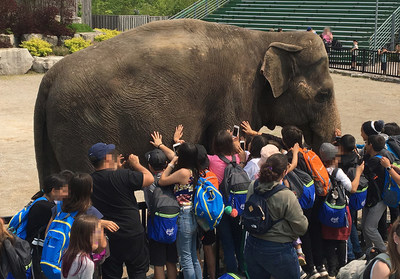World Animal Protection celebrates introduction of Animal Welfare Legislation in the Senate
The legislation would be a 'game changer' and most sweeping legislation in years to protect animals from being used for entertainment purposes
TORONTO, March 22, 2022 /CNW/ - World Animal Protection is celebrating an important milestone in animal welfare in Canada with the introduction of the Jane Goodall Act in the Senate. The private Members' bill sponsored by Senator Marty Klyne would significantly restrict the ownership of exotic animals in Canada and lead to the end of most unregulated and underregulated zoos (also known as roadside zoos) in Canada.
"This is a historic bill that would make Canada a global leader in protecting wildlife and animal welfare. It would phase out the practice of keeping certain animals for entertainment and exotic pets," said Melissa Matlow, Campaign Director at World Animal Protection. "And we hope it will motivate the government to pass stronger regulations to curb the commercial trade of wild animals to prevent cruelty, extinction and future pandemics."
Hundreds of wild animal species are included in the legislation such as: elephants, great apes, monkeys, big cats (such as tigers and lions), most bears, wolves and several reptiles. It would ban the use of these animals for entertainment (e.g., elephant rides and shows).
The bill also proposes a ban on the domestic trade of elephant ivory and rhino horns, as well as trophies, to conserve the struggling wild populations.
World Animal Protection helped contribute data and consulted on the drafting of the legislation.
Across all levels of government, World Animal Protection has been advocating for decades for changes to zoo and exotic animal regulations. Our advocacy has led to various travel companies adopting policies to not sell wildlife entertainment attractions.
World Animal Protection research found more than 1.4 million wild animals are kept as pets in Canadian households, and Canada continues to import hundreds of thousands of wild animals every year.
"It is a problem that persists in both the legal and illegal wildlife trade, and Canada has a role to play," added Matlow. "We encourage the Federal government to adopt this legislation as a government bill and make it a priority to pass."
From our offices worldwide, including China, Brazil, Kenya, and Canada, we move the world to protect animals. Last year, we gave more than 220 million animals better lives through our campaigns that focus on animals in the wild, animals in disasters, animals in communities, and animals in farming. For more information visit www.worldanimalprotection.ca
SOURCE World Animal Protection
News published on and distributed by:




